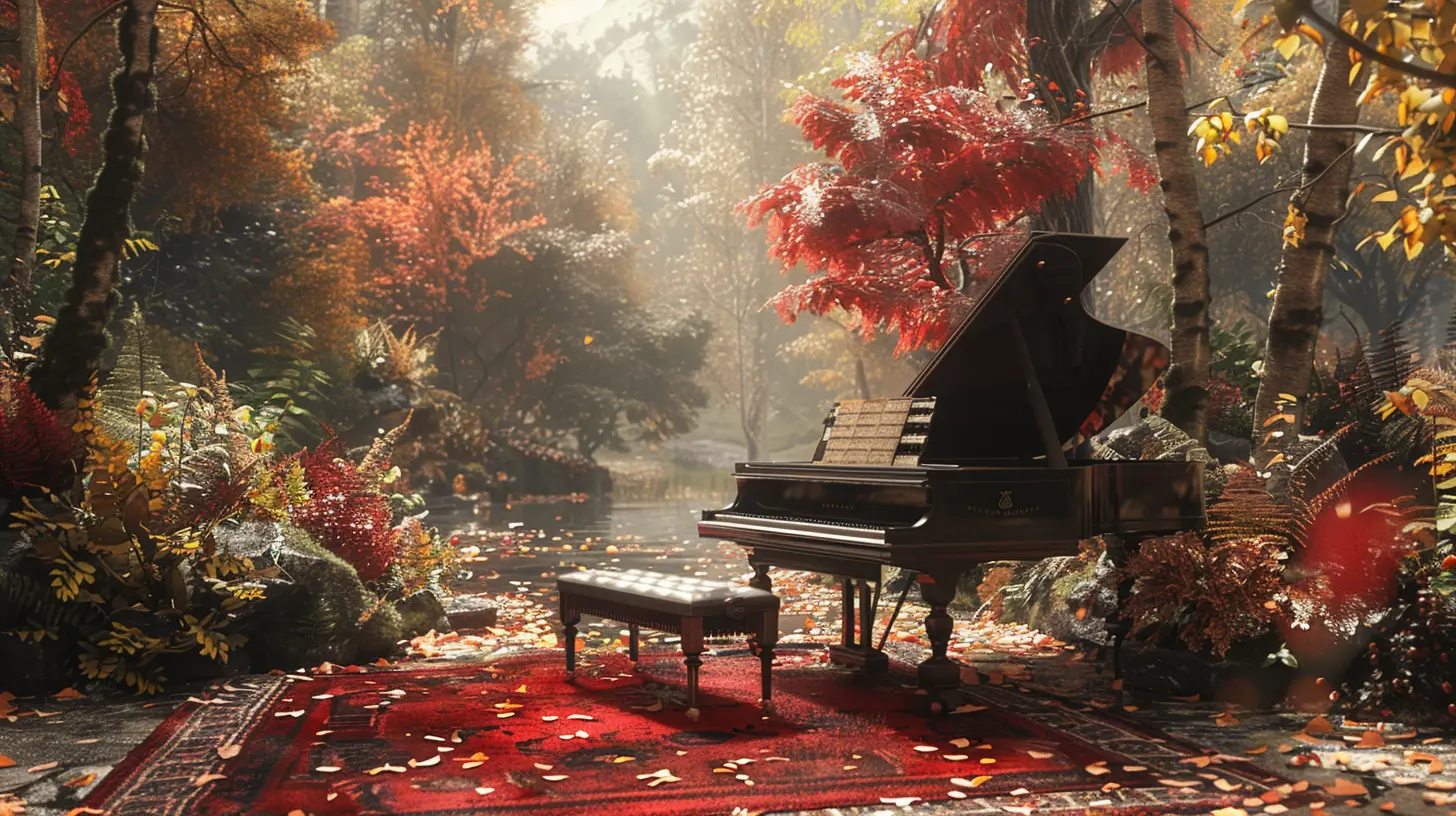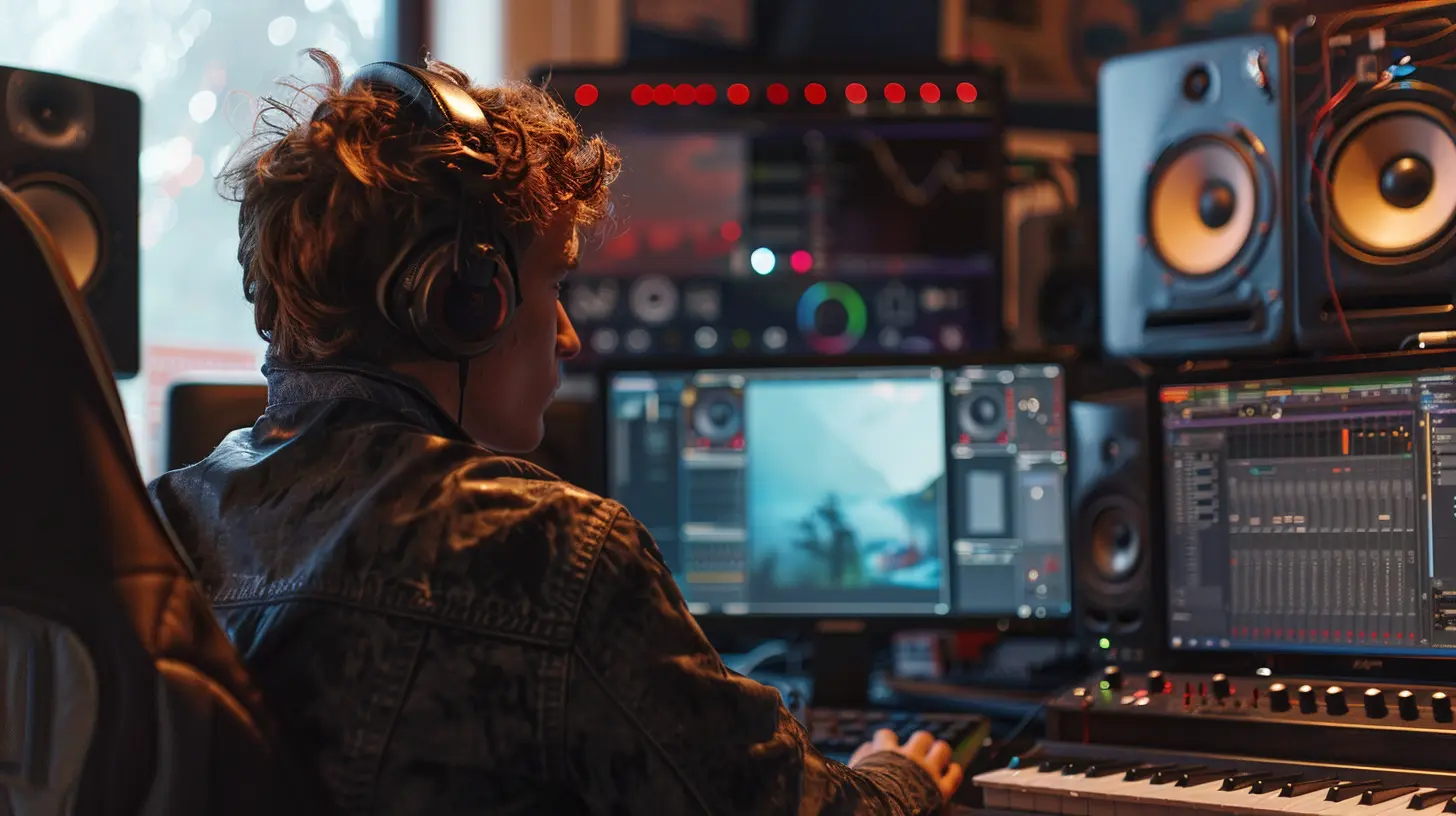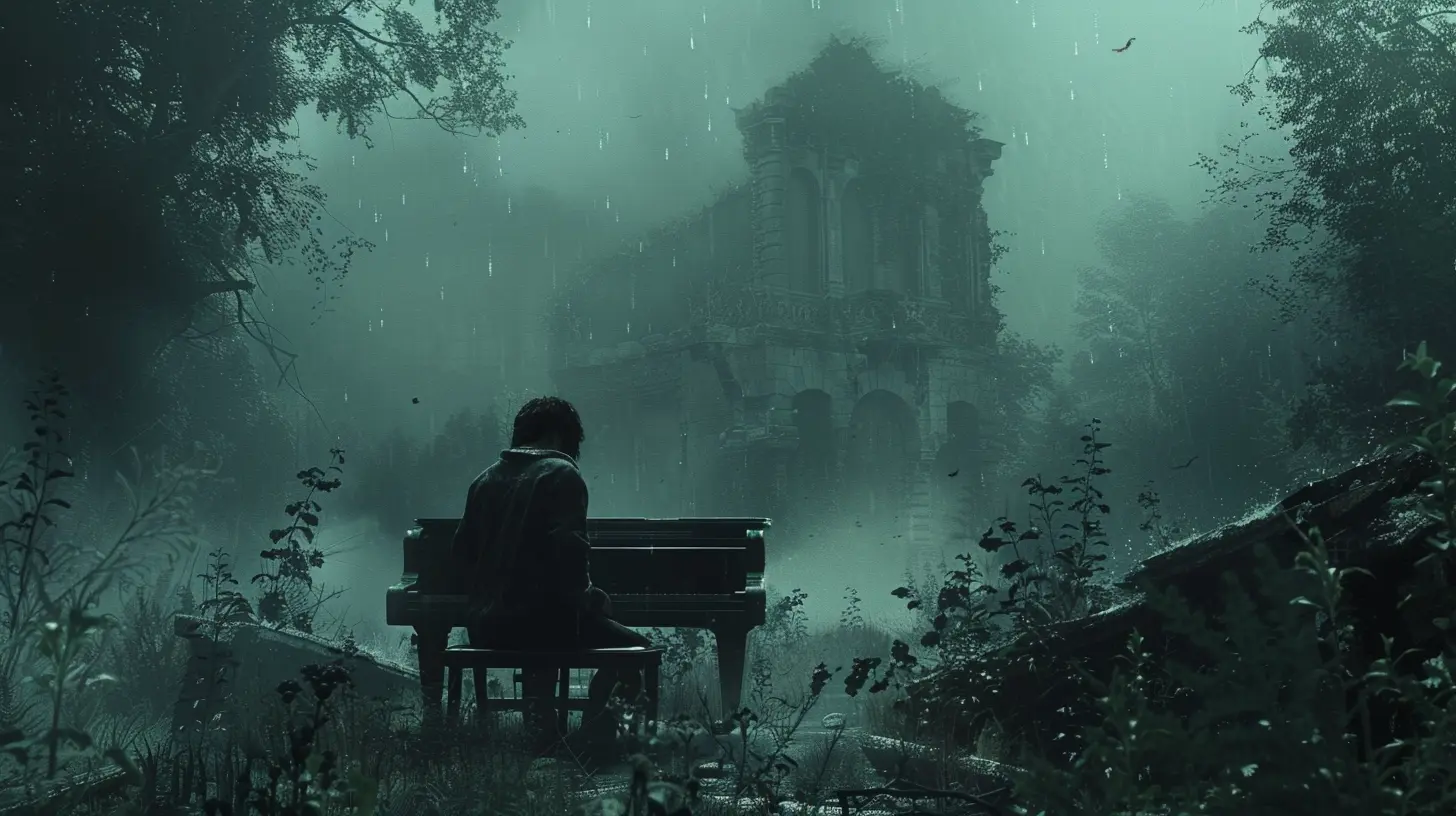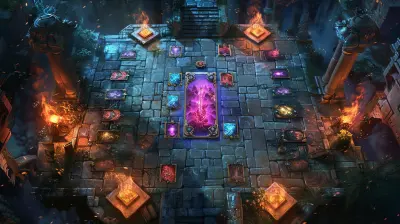The Meticulous Craft of Composing for Interactive Media
2 March 2025
Picture this: you’re playing your favorite video game, completely lost in a breathtaking world brought to life by stunning visuals and thrilling gameplay. But there’s something else that hooks you even deeper—something you might not consciously think about yet couldn’t experience the game without. Yep, I’m talking about the music. The emotional pulls of a swelling orchestra, the eerie suspense of a faint echo, or the adrenaline-pumping beat during a boss fight—all of it ties back to the incredible craft of composing for interactive media.
But let me tell you, it’s not just a matter of throwing together a catchy tune or slapping a few sound effects over some gameplay footage. Nope, it’s an intricate and deeply thoughtful process—a blend of storytelling, technology, and pure creative genius. Composing for interactive media is a unique art form that demands precision, adaptability, and, above all, heart. Let’s dive into what makes this craft so meticulous and special.
What Exactly Is Composing for Interactive Media?
Before we get into the nitty-gritty, let’s answer the basics: what do we mean by "interactive media"? It’s essentially any medium where the audience engages in real-time—think video games, virtual reality experiences, or even interactive films. Unlike passive media, such as TV shows or movies, interactive media requires a dynamic and responsive approach.Now here's the kicker: the music for interactive media has to adapt to the player or user’s actions. Unlike a movie score, which is linear and unfolds at a pre-determined pace, interactive music ebbs and flows based on what’s happening onscreen. If the player goes on a stealth mission, you can’t have triumphant battle music blaring in the background, right? That would just ruin the entire vibe. The composer’s job is to make sure the music feels seamless—like it’s reading the player's mind.
The Challenges of Writing Adaptive Music
Let’s face it—composing for interactive media is not for the faint of heart. It’s an art, but it’s also a science. The music doesn’t just have to sound great; it has to work. And trust me, that’s no cakewalk. Here’s why:1. The Non-Linear Nature of Interactive Media
Imagine trying to write a song that flows perfectly but doesn’t have a set beginning, middle, or end. That’s what composers for interactive media have to do! In a video game, players wander, explore, fight, or even pause the game at their leisure. The music can’t follow a straight path like it does in a movie. Instead, composers create layers of music or loops that can change seamlessly depending on the player's actions.Think of it like Lego blocks. Each piece (or musical segment) needs to fit perfectly with the next one, regardless of the order they’re played in. That’s tricky, right? It’s like trying to bake a cake where every slice is delicious on its own and still works no matter how you rearrange them.
2. Syncing Music to Emotion
Music in interactive media doesn’t just follow actions; it mirrors emotions. When you’re sneaking through a dungeon or racing against the clock, the music needs to reflect the intensity of the moment. But here's the thing: people experience emotions differently. While one player might feel tense during a chase scene, another might feel excited.To tackle this, composers often use something called "dynamic music systems." These allow the soundtrack to shift seamlessly—getting louder, softer, faster, or more intense based on the gameplay. It’s like having a mood ring that adapts in real time.
3. Balancing Music and Sound Effects
Interactive media comes with a lot of competing sounds: explosions, dialogue, footsteps, magical spells—you name it. The music can’t overpower these sound effects, but it also can’t fade into the background and go unnoticed. This delicate balance requires composers to be mindful of audio layering.It’s like being in a band where every musician has to play in sync without stepping on each other’s toes. One misplaced violin can throw the entire composition out of whack.
Tools of the Trade: A High-Tech Craft
If you’re picturing a composer sitting at a piano all day, think again. Sure, traditional composition skills are important, but composing for interactive media is also a highly technical craft. Here’s a glimpse into the toolbox of an interactive music composer:1. Middleware Software
Ever heard of programs like FMOD or Wwise? These are industry-standard tools that help composers integrate their music into games. Middleware acts like a bridge, translating music into something the game engine understands. It’s what makes the soundtrack react in real time to the player’s actions.2. DAWs (Digital Audio Workstations)
Composers use DAWs like Logic Pro, Cubase, or Ableton to create their music. These workstations allow for sophisticated layering, mixing, and fine-tuning of audio tracks. Think of it as their musical canvas.3. Game Engines
Understanding game engines like Unity or Unreal Engine is a major plus for composers. The closer they can work with the game developers and programmers, the smoother the integration process will be. Plus, having some coding knowledge doesn’t hurt.
Why Storytelling Matters in Game Music
Let’s get real for a second. At its core, interactive media is about storytelling. Whether you’re saving a kidnapped princess or unraveling the mysteries of a dystopian future, the story is what keeps players hooked. And just like dialogue or visuals, music is a key storytelling element.Here’s a little food for thought: imagine playing “The Legend of Zelda” without its iconic theme music. Doesn’t hit the same, does it? That’s because the score is just as much a part of the narrative as the characters or plot. The best composers treat their music like another character in the game—it has its own journey, its own role to play.
Take someone like Jesper Kyd, the genius behind the music of the Assassin’s Creed games. His haunting vocal melodies transport you to Renaissance Italy, making you feel like you’re stepping into history. Or consider Gareth Coker’s beautiful score for “Ori and the Blind Forest”—it doesn’t just enhance the gameplay; it becomes an emotional guide for the player. That’s the power of storytelling through music.
Collaboration: The Unsung Hero of Interactive Music
Here’s a little secret: composing for interactive media is a team sport. Composers don’t work in isolation. They’re constantly bouncing ideas around with game developers, sound designers, and writers. Why? Because music has to fit seamlessly with every other aspect of the game.Think of it like building a puzzle. Every piece—art, sound, gameplay—has to click into place. Composers work closely with the team, tweaking their music to match the game’s tone, pacing, and mechanics. Without this collaboration, the game could feel disjointed or incomplete.
The Future of Music in Interactive Media
As technology evolves, so does the art of composing for interactive media. With advancements in artificial intelligence and machine learning, we’re already seeing experiments in procedurally generated music. Imagine a soundtrack that’s completely unique to your gameplay experience—no two players hear the same thing. Sounds wild, right?We’re also seeing a rise in 3D audio and spatial soundscapes, especially in VR. These techniques immerse players even further, making the music feel like it’s coming from all around you. It’s a game-changer (literally).
Why It Matters
Okay, let’s wrap this up. Why is the meticulous craft of composing for interactive media so important? Because it’s more than just background noise. It’s the heartbeat of the experience. It enhances immersion, deepens storytelling, and connects players to the game on an emotional level.So the next time you’re dodging bullets in an FPS or shedding tears over a heartbreaking cutscene, take a moment to appreciate the music. Behind every note is a composer who poured their heart and soul into creating something magical—just for you.
all images in this post were generated using AI tools
Category:
Original SoundtracksAuthor:

Lucy Ross
Discussion
rate this article
10 comments
Natalia Hayes
This article beautifully highlights the intricate artistry of composing for interactive media—truly inspiring and insightful! Thank you!
April 7, 2025 at 4:43 PM

Lucy Ross
Thank you so much for your kind words! I'm glad you found the article inspiring.
Adeline Mercado
This article elegantly captures the nuanced relationship between music and gameplay, emphasizing how a composer’s meticulous attention to interactivity can profoundly elevate the player’s emotional experience.
April 1, 2025 at 3:52 PM

Lucy Ross
Thank you for your thoughtful insight! I'm glad you resonated with the exploration of music's role in enhancing gameplay experiences.
Quincy McMahon
Thank you for this insightful article! The exploration of composing for interactive media highlights the unique challenges and creative possibilities in the craft. I appreciate the depth of analysis and look forward to more discussions on this topic!
March 30, 2025 at 4:18 PM

Lucy Ross
Thank you for your kind words! I'm glad you found the article insightful and engaging. I look forward to more discussions on this fascinating topic!
Holden Phelps
A captivating exploration of sound’s transformative power in gaming.
March 24, 2025 at 5:31 PM

Lucy Ross
Thank you! I'm glad you found the exploration of sound in gaming captivating. It truly plays a vital role in enhancing player experience.
Monique McGeehan
Great insights on the intricate relationship between music and gameplay! Exploring how compositions enhance player emotions and narrative depth adds a valuable perspective. Looking forward to more discussions on the evolving role of composers in interactive storytelling. Keep up the excellent work!
March 21, 2025 at 3:22 PM

Lucy Ross
Thank you for your kind words! I'm glad you enjoyed the insights and I look forward to more discussions on this fascinating topic!
Vireo Moore
This article beautifully captures the intricate relationship between music and gaming. It’s fascinating how soundscapes enhance emotional depth, creating a truly immersive interactive experience. Well done!
March 20, 2025 at 3:54 PM

Lucy Ross
Thank you for your thoughtful comment! I'm glad you found the connection between music and gaming so compelling.
Davina McGhee
Ah, composing for interactive media—a delightful dance where every note must not only sound great but also convince players to save the world instead of grabbing a snack!
March 19, 2025 at 4:49 AM

Lucy Ross
Absolutely! It's all about creating an immersive experience that engages players emotionally and motivates them to stay invested in the game.
Thane McLemore
Composing for interactive media is like baking a cake—each note needs just the right amount of sugar and spice! Whether you’re frosting a thrilling chase or sprinkling some sentiment, let’s hope no one mistakes it for a soggy bottom. Keep it playful, composers!
March 14, 2025 at 5:10 AM

Lucy Ross
Absolutely! Just like baking, each element in interactive media composition contributes to the overall experience. Balancing those flavors is key to keeping the audience engaged. Thanks for the delightful analogy!
Julianne Sharp
Music defines the experience!
March 8, 2025 at 5:01 AM

Lucy Ross
Absolutely! Music shapes emotional connections and enhances the immersive experience in interactive media.
Lena McGowan
This article beautifully highlights the intricate relationship between music composition and immersive gaming experiences. Well done!
March 5, 2025 at 5:05 AM

Lucy Ross
Thank you! I'm glad you enjoyed the article and appreciated the connection between music and gaming.
MORE POSTS

Thriving in Team-Based Multiplayer Shooters

Did the New Patch Fix That Annoying Bug? Let’s Find Out

Free-to-Play Card Games for Deck-Building Enthusiasts

When to Grind and When to Move On

Unlocking the Secrets to Ranking Up in Online Matches

The Rise of YouTube Gaming Channels: What Makes Them So Popular

Understanding the Drop Rates in Loot Boxes